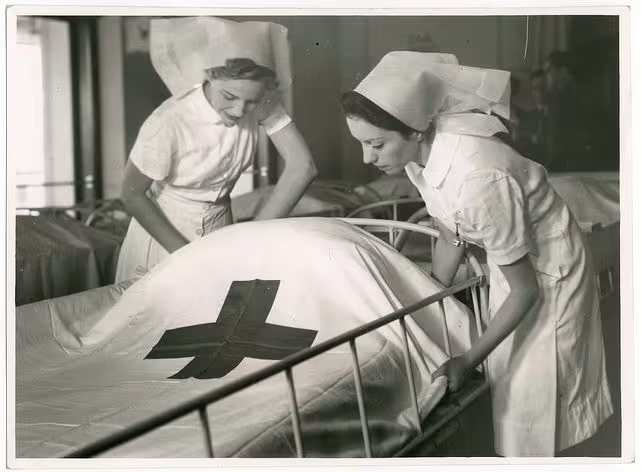Hospitals are weird, man!
Each blog post is dated and contains accurate information as of that date. Certain information may have changed since the blog post publication date. If you would like to confirm the current accuracy of blog information, please visit our ABSN overview page or contact admissions at 866.892.6463.
This post was written by Chase Christy, patient support partner at Community Health. He is also an accelerated nursing student at Marian University in Indianapolis.
I lead with a question: What was going on with the nursing head wear of eras past? Was there a specific purpose to such elaborate designs? (If you have ever perused the lobby of St.Vincent, you can see some real doozies.) The fact is, if one was not a medical professional during the time when the following picture was taken, the sight of women wearing all white along with what appear to be pillowcases on their heads would be a bit jarring. While the head wear has changed, the point remains the same.
Hospitals are weird, man!

When you go to work in a new office, you can look around and see things that you have used before. (I’m hoping you’ve learned to use a stapler at some point in your life.) This is simply not the case in a hospital setting. Nothing is familiar. Everything requires special knowledge and skill, and I guarantee it has a really strange name and probably an acronym that people use for it.
I’ve come to enjoy telling a story from my very first day on a unit. I’m what is called a patient support partner at Community Health Network - basically, a nursing assistant. I was in orientation and had just met my preceptor for the day. His name was Steve. So, Steve said we needed to go in a room and turn a patient or something like that. I followed Steve like a lost puppy over to the threshold of the room, but we couldn’t just go in as the patient was in isolation. He walked up to the isolation cart stationed right outside of the room. As if it was one fluid motion, Steve grabbed a gown out of a drawer, threw it on, tied it up (behind his back, mind you, as is the way with isolation gowns), put his gloves on and entered the patient’s room.
What Steve didn't realize as he reached the bedside was that I was still trying to figure out what size of gloves I wore. The problem was exacerbated by the alcohol foam I had rubbed into my hands for the first time and the fact that I hadn't rubbed it in enough. I just couldn’t get the gloves on my hands. I stood there trying and trying, looking like the biggest idiot on Earth. In the meantime, Steve did everything he needed to do in the room, removed his gown, washed up and came back out of the room, only to find me standing there in the exact same place, still fumbling with my gloves.
Hospitals are weird, man!
I cannot emphasize enough the importance of getting clinical work experience after you graduate. At Marian, your education includes hospital clinical rotations from day one, but don’t stop there. The hospital environment is otherworldly. It takes time to adjust and acclimate. It takes time to get comfortable with everything, from tasks as simple as getting gloves on, to more complicated things like how to move through a room caring for a patient while documenting your every move. It takes time to build relationships that will get you hired upon graduation. While there is a shortage of nurses, there is also a shortage of really desirable positions and shifts. It is getting more competitive every day.
So, get out there and get yourself some clinical work experience - specifically in direct patient care. Each hospital network uses different names for their entry-level positions, so you may want to start your search by contacting the HR departments of each network to verify which positions you should be applying for. (Make sure you tell them you are a nursing student at Marian. We have a great reputation in the community!) Even if you grab a shift or two a month, it is well worth it. There is a huge difference between learning step by step from an instructor and having experience working autonomously.
Don’t let your first day as an RN be your first day truly working on your own. Remember, hospitals are weird, man!
